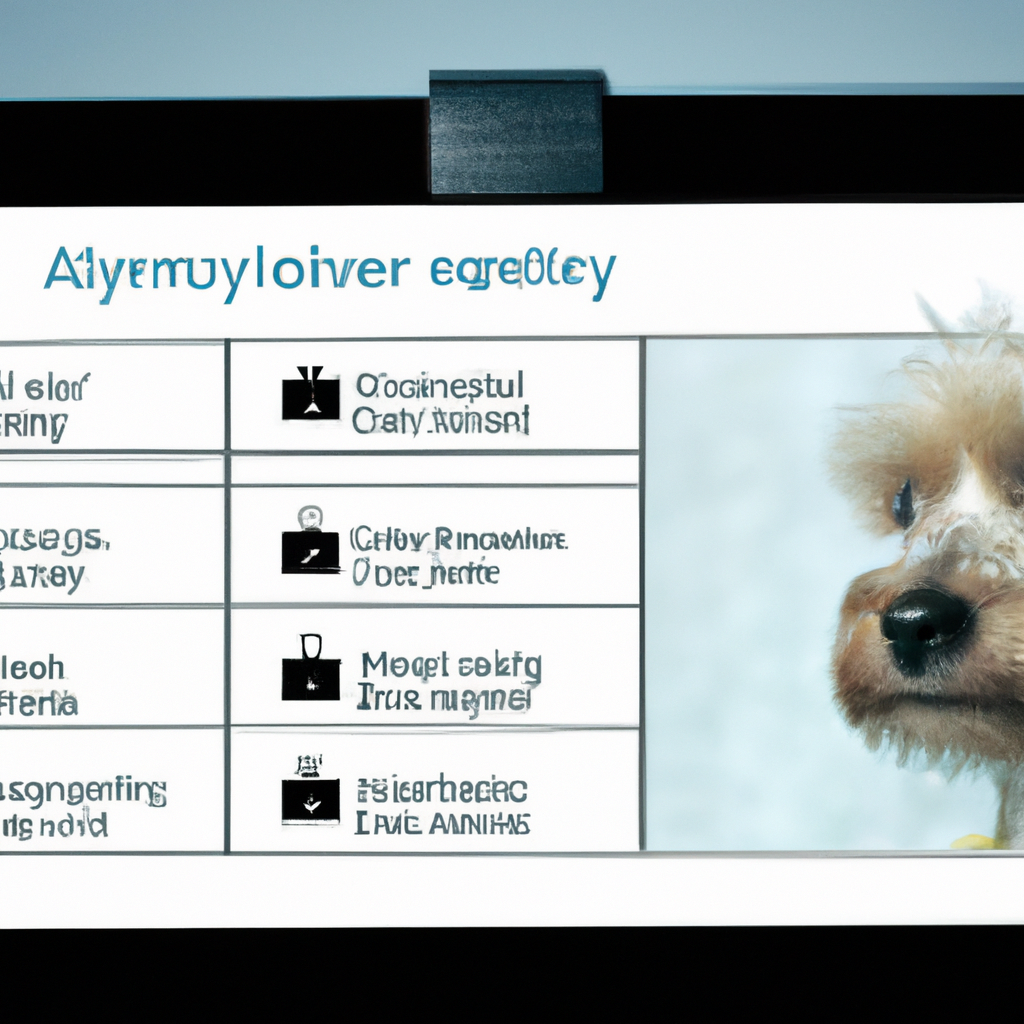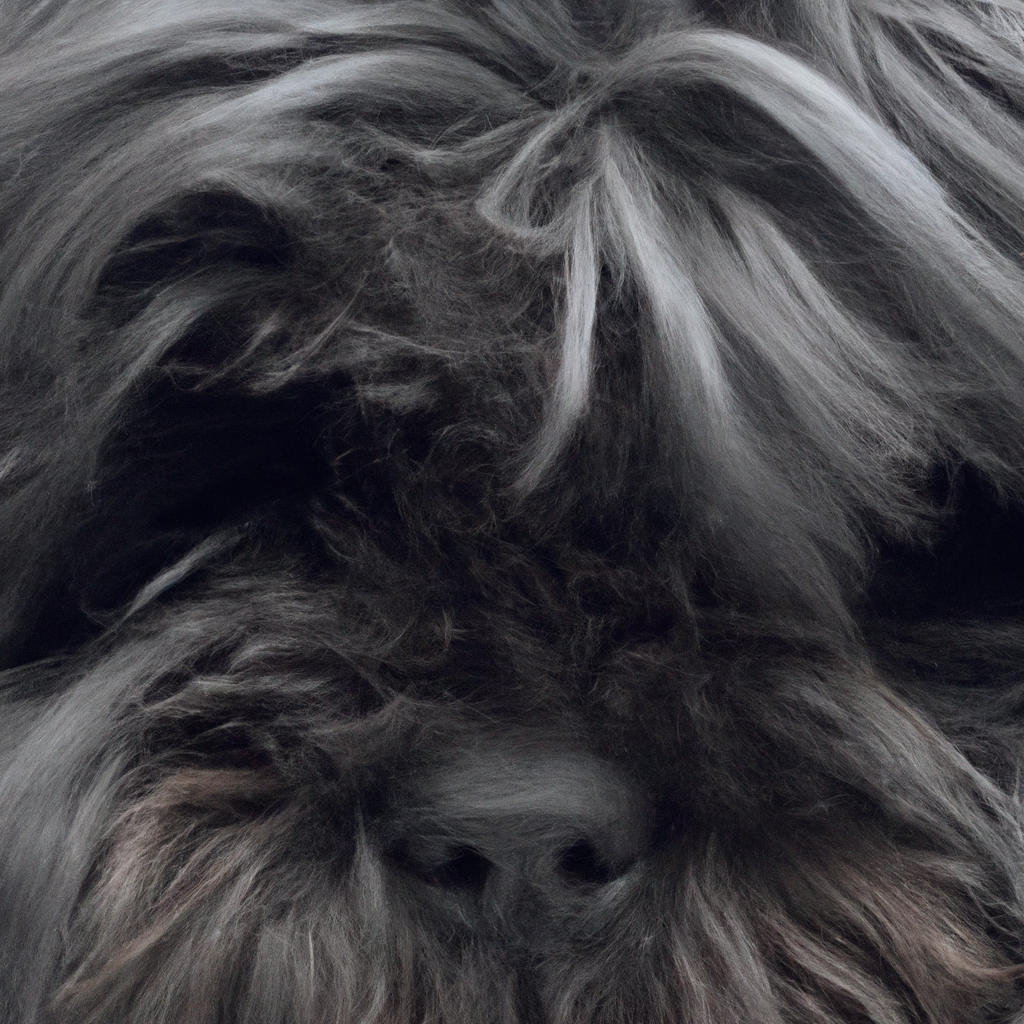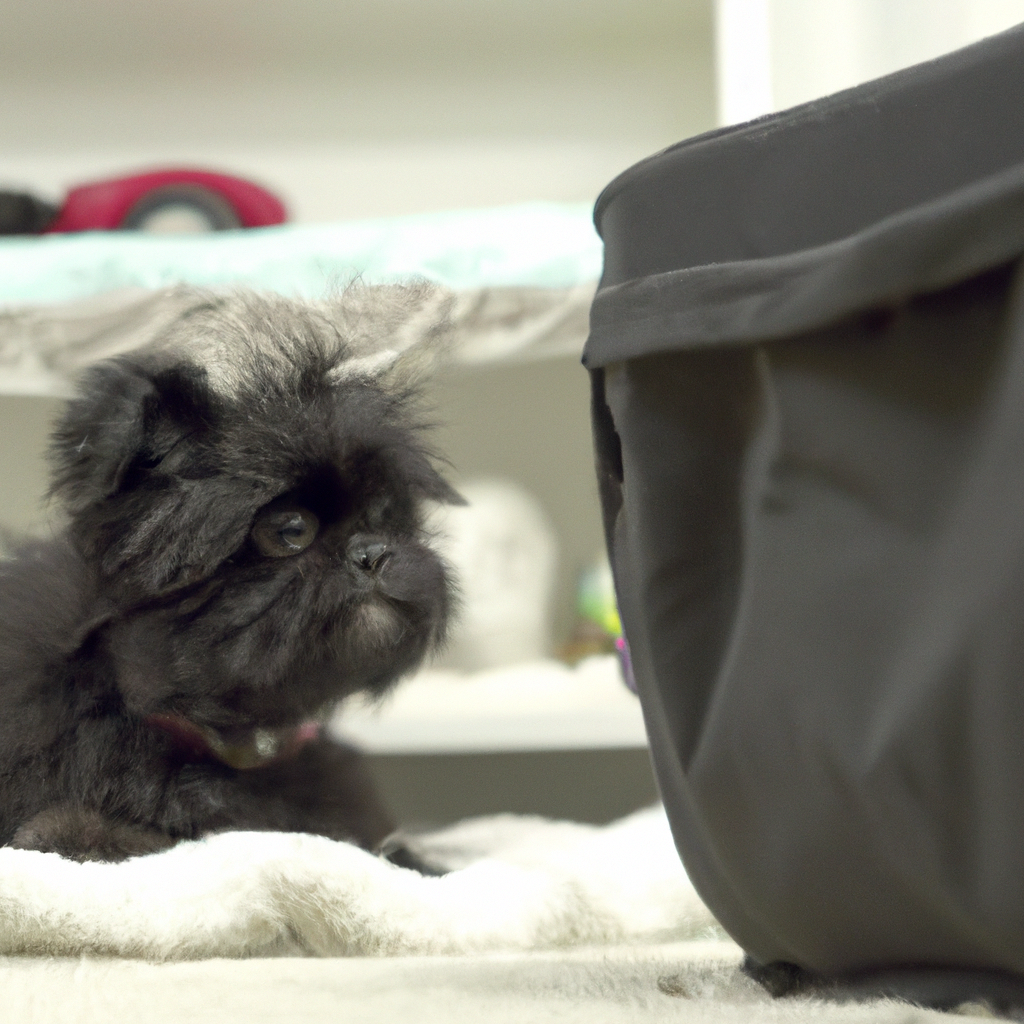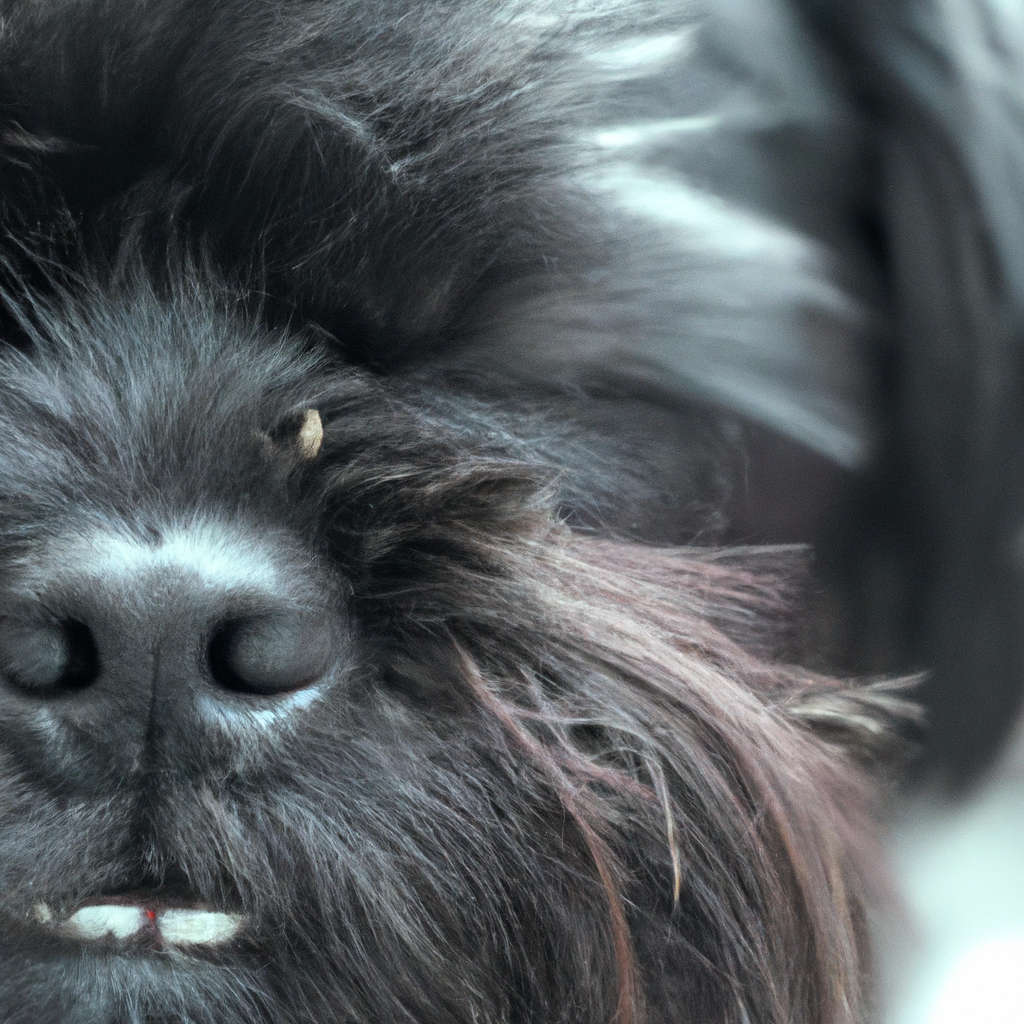The Affenpinscher, also known as the Monkey Terrier, is a small breed of dog that is known for its playful and adventurous nature. Despite its many positive attributes, potential owners should be aware of certain allergen information related to this breed. Like all dogs, Affenpinschers produce dander, saliva, and urine which can trigger allergic reactions in sensitive individuals. Although they are considered a hypoallergenic breed due to their low-shedding coats, no breed is completely hypoallergenic. Therefore, individuals with severe allergies should spend time with an Affenpinscher before deciding to bring one into their home to ensure they do not have an allergic reaction.
Understanding Common Allergens for Affenpinschers
Affenpinschers, also known as “Monkey Terriers,” are a small breed of dog that originated in Germany. These dogs are known for their distinctive, monkey-like faces and their playful, energetic personalities. However, like all breeds, Affenpinschers can be susceptible to certain allergens. Understanding these common allergens can help you keep your Affenpinscher healthy and happy.
Firstly, let’s delve into food allergens. Affenpinschers, like many other breeds, can be allergic to certain types of food. Common food allergens for dogs include beef, dairy, wheat, egg, chicken, lamb, soy, pork, rabbit, and fish. If your Affenpinscher is allergic to a certain type of food, they may experience symptoms such as itching, skin rashes, ear infections, and gastrointestinal problems. If you notice any of these symptoms, it’s important to consult with your vet. They may recommend an elimination diet to determine which food is causing the reaction.
Next, let’s talk about environmental allergens. These can include things like pollen, dust mites, mold, and certain types of grass. Affenpinschers with environmental allergies may experience symptoms such as sneezing, itching, and watery eyes. They may also develop skin problems, such as rashes or hot spots. If you suspect that your Affenpinscher has an environmental allergy, your vet can perform tests to determine the cause. Treatment may involve medication, allergy shots, or changes to your dog’s environment.
Another common allergen for Affenpinschers is fleas. Fleas can cause a condition known as flea allergy dermatitis, which can lead to severe itching and skin problems. If your Affenpinscher is allergic to fleas, it’s crucial to keep them on a regular flea prevention regimen. This can include topical treatments, oral medications, or flea collars. Regular grooming and vacuuming can also help to keep fleas at bay.
Lastly, some Affenpinschers may be allergic to certain types of materials. This can include things like certain types of fabric, rubber, or plastic. If your Affenpinscher is allergic to a certain material, they may develop skin problems or respiratory symptoms when they come into contact with it. If you suspect that your Affenpinscher has a material allergy, it’s important to remove the offending material from their environment.
In conclusion, while Affenpinschers are a generally healthy breed, they can be susceptible to certain allergens. These can include food allergens, environmental allergens, fleas, and certain materials. If you suspect that your Affenpinscher has an allergy, it’s important to consult with your vet. They can perform tests to determine the cause of the allergy and recommend appropriate treatment. By understanding these common allergens, you can help to keep your Affenpinscher healthy and happy. Remember, every dog is unique, and what affects one Affenpinscher may not affect another. Always keep a close eye on your pet and report any changes in behavior or health to your vet.
How to Manage Food Allergies in Affenpinschers
Affenpinschers, also known as “Monkey Terriers,” are small but mighty dogs known for their distinctive appearance and playful personalities. However, like many other breeds, Affenpinschers can be prone to certain health issues, including food allergies. Understanding these allergies and how to manage them can significantly improve your Affenpinscher’s quality of life.
Food allergies in Affenpinschers can manifest in various ways. Some dogs may experience skin irritations, such as itching, redness, and hot spots. Others may suffer from gastrointestinal issues like vomiting, diarrhea, or excessive gas. If your Affenpinscher is showing any of these symptoms, it’s essential to consult with a veterinarian. They can help determine if a food allergy is the cause and guide you on the best course of action.
One of the first steps in managing food allergies in Affenpinschers is identifying the allergen. Common culprits include beef, dairy, wheat, egg, chicken, lamb, soy, pork, rabbit, and fish. However, every dog is unique, and what causes an allergic reaction in one Affenpinscher may not in another. To pinpoint the allergen, your vet may recommend an elimination diet. This involves feeding your dog a diet free of common allergens and gradually reintroducing potential triggers to see which one causes a reaction.
Once the allergen has been identified, the next step is to eliminate it from your Affenpinscher’s diet. This may involve switching to a hypoallergenic dog food or preparing homemade meals for your pet. If you choose the latter, it’s crucial to ensure that your dog’s diet is balanced and nutritious. A pet nutritionist can provide guidance on what to include in your Affenpinscher’s meals.
In addition to dietary changes, there are other strategies to help manage your Affenpinscher’s food allergies. Regular grooming can help soothe skin irritations and prevent secondary infections caused by scratching. Using hypoallergenic shampoos and conditioners can also provide relief. Moreover, certain supplements, such as omega-3 fatty acids, can help reduce inflammation and support skin health.
It’s also worth noting that managing food allergies in Affenpinschers is not a one-size-fits-all approach. What works for one dog may not work for another. Therefore, it’s important to work closely with your vet and monitor your dog’s response to different treatments. Regular check-ups can help track your dog’s progress and make necessary adjustments to their care plan.
While dealing with food allergies can be challenging, it’s important to remember that many Affenpinschers live happy, healthy lives with the right management. With patience, persistence, and the right support, you can help your Affenpinscher navigate their food allergies and enjoy their meals without discomfort.
In conclusion, food allergies in Affenpinschers can be managed effectively with the right approach. Identifying the allergen, making dietary changes, regular grooming, and using supplements can all play a role in managing your dog’s allergies. Remember, every Affenpinscher is unique, and what works for one may not work for another. Therefore, it’s crucial to work closely with your vet and monitor your dog’s response to different treatments. With the right care and attention, your Affenpinscher can live a happy, healthy life, free from the discomfort of food allergies.
Seasonal Allergies and Your Affenpinscher: What You Need to Know
If you’re the proud owner of an Affenpinscher, you’re likely well-acquainted with their playful, adventurous spirit. These small, scruffy dogs are known for their boundless energy and affectionate nature. However, like all breeds, Affenpinschers can be susceptible to certain health issues, including seasonal allergies. Understanding these allergies and how they can affect your Affenpinscher is crucial to ensuring their health and happiness.
Seasonal allergies in Affenpinschers, as in humans, are typically caused by environmental factors such as pollen, mold, dust mites, and certain types of grass or trees. These allergens can trigger an immune response in your dog, leading to a variety of symptoms. These can range from mild, such as itching and sneezing, to more severe, like skin infections or respiratory issues.
As we transition from one season to the next, you may notice your Affenpinscher exhibiting signs of discomfort. They may scratch or lick themselves excessively, leading to red, inflamed skin. Their eyes might become watery or red, and they may sneeze or cough more than usual. These are all signs that your Affenpinscher could be suffering from seasonal allergies.
If you suspect your Affenpinscher has seasonal allergies, it’s important to consult with a veterinarian. They can perform tests to confirm the diagnosis and identify the specific allergens causing the reaction. Once the allergens have been identified, your vet can recommend a treatment plan. This might include medication to manage the symptoms, changes to your dog’s diet, or lifestyle modifications to reduce exposure to the allergens.
One of the most effective ways to manage your Affenpinscher’s seasonal allergies is through prevention. Regular grooming can help remove allergens from your dog’s coat and skin, reducing their exposure. Vacuuming and dusting your home frequently can also help minimize the presence of allergens. If your Affenpinscher is allergic to certain types of grass or plants, try to avoid these during walks or playtime.
Diet can also play a role in managing your Affenpinscher’s allergies. Some dogs may benefit from a hypoallergenic diet, which eliminates common food allergens. Omega-3 fatty acids, found in fish oil, can also help reduce inflammation and improve skin health. Always consult with your vet before making any changes to your dog’s diet.
While seasonal allergies can be uncomfortable for your Affenpinscher, they are manageable with the right care and attention. Regular check-ups with your vet can help catch any potential issues early, and a proactive approach to prevention can make a big difference in your dog’s comfort and quality of life.
In conclusion, owning an Affenpinscher is a joy and a responsibility. Their playful nature and loving temperament make them a wonderful addition to any family. However, like all pets, they require care and attention to ensure they stay healthy and happy. By understanding the potential for seasonal allergies and how to manage them, you can help your Affenpinscher live a comfortable, fulfilling life. Remember, your vet is your best resource for any health concerns you may have about your pet.
Affenpinscher Allergies: Symptoms and Treatments
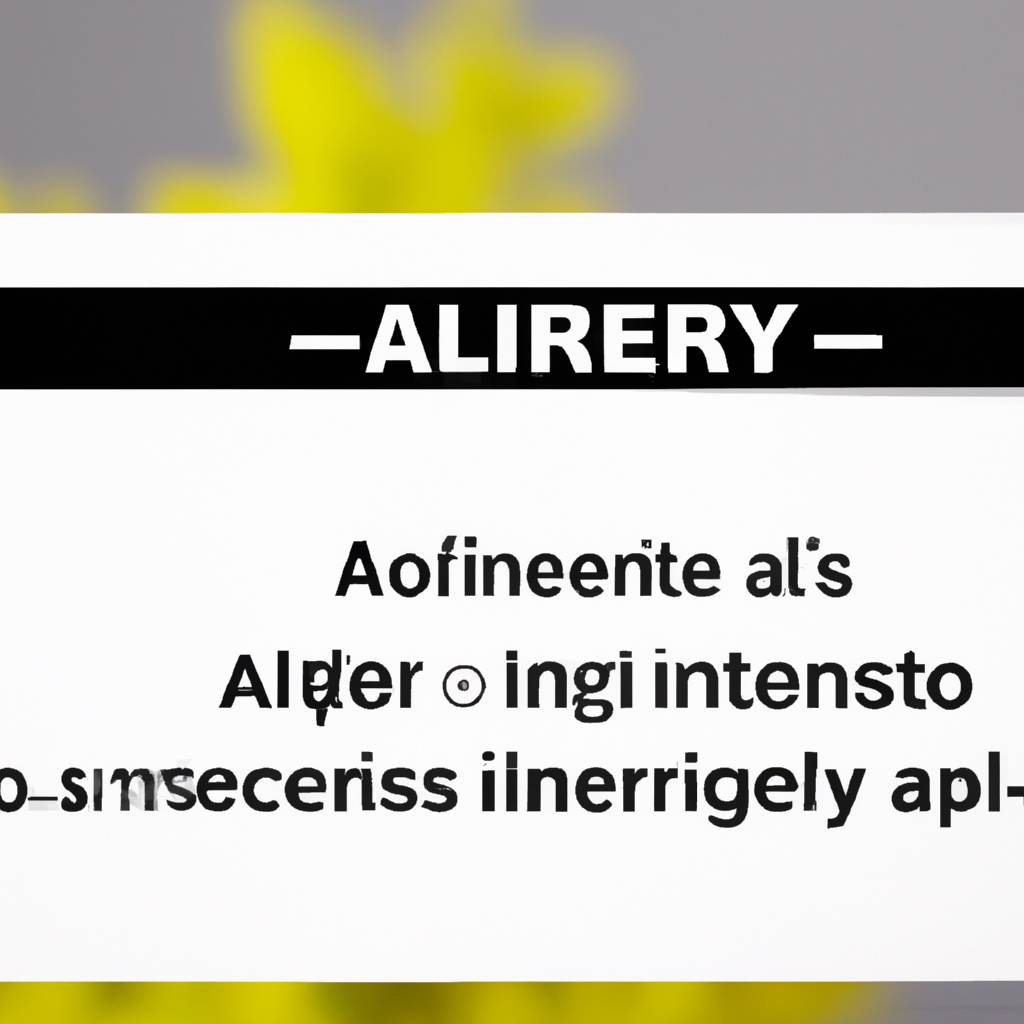
Affenpinschers, often referred to as “Monkey Dogs” due to their distinctive, primate-like appearance, are a popular breed among dog lovers. However, like all breeds, they are not immune to allergies. Understanding the symptoms and treatments for Affenpinscher allergies can help you ensure your furry friend stays healthy and happy.
Allergies in Affenpinschers can manifest in a variety of ways. Some of the most common symptoms include excessive scratching, redness of the skin, frequent ear infections, and gastrointestinal issues such as vomiting or diarrhea. If your Affenpinscher is displaying any of these symptoms, it’s crucial to consult with a veterinarian to determine if allergies are the cause.
Affenpinschers can be allergic to a wide range of substances. Food allergies are common, with certain proteins like beef, chicken, or dairy often being the culprits. Environmental allergens such as pollen, dust mites, and mold can also trigger allergic reactions. Additionally, Affenpinschers can be sensitive to certain materials, such as specific types of fabric or carpeting, which can cause contact dermatitis.
Once an allergy is identified, treatment can begin. For food allergies, an elimination diet is often recommended. This involves removing all potential allergens from the dog’s diet and gradually reintroducing them one by one to identify the offending food. Once the allergen is identified, it can be permanently removed from the dog’s diet.
For environmental allergies, treatment can be a bit more complex. Avoiding the allergen is the best course of action, but this isn’t always possible, especially with allergens like pollen or dust. In these cases, medication may be necessary. Antihistamines can help control the allergic reaction, while corticosteroids can help reduce inflammation and itching. In severe cases, immunotherapy, which involves gradually exposing the dog to small amounts of the allergen to build up immunity, may be recommended.
Contact dermatitis can be treated by identifying and removing the offending material. In the meantime, topical creams and ointments can help soothe the skin and reduce inflammation.
It’s important to remember that every Affenpinscher is unique, and what works for one dog may not work for another. It may take some trial and error to find the right treatment for your Affenpinscher’s allergies. However, with patience and the guidance of a trusted veterinarian, you can help your Affenpinscher live a comfortable, allergy-free life.
In conclusion, while Affenpinschers can be prone to allergies, these can be managed with the right knowledge and care. By being aware of the symptoms and potential causes of allergies, you can take swift action to alleviate your dog’s discomfort. Whether it’s through dietary changes, medication, or environmental modifications, there are many ways to treat and manage allergies in Affenpinschers. Remember, the key is to work closely with your vet and to be patient as you figure out the best course of action for your furry friend.
The Role of Genetics in Affenpinscher Allergies
Affenpinschers, also known as “Monkey Terriers,” are small, playful dogs known for their distinctive, almost human-like facial expressions. While they are generally healthy, they can be prone to certain allergies, just like any other breed. Understanding the role of genetics in Affenpinscher allergies can help owners provide the best care for their furry friends.
Allergies in Affenpinschers, as in other breeds, are essentially an overreaction of the immune system to substances that are usually harmless. These substances, known as allergens, can be found in a variety of sources, including food, the environment, and even the dog’s own body. When an Affenpinscher with a genetic predisposition to allergies encounters these allergens, its immune system may respond by releasing histamines, leading to symptoms such as itching, redness, and inflammation.
Genetics play a significant role in determining whether an Affenpinscher will develop allergies. Just as humans inherit traits like eye color and height from their parents, dogs can inherit a predisposition to allergies. This doesn’t mean that every Affenpinscher will develop allergies, but those with a family history of allergies are at a higher risk.
The genetic component of allergies is complex and not fully understood. It’s not as simple as one gene causing allergies; instead, it’s likely that multiple genes contribute to the development of allergies. These genes may affect various aspects of the immune system, including how it recognizes allergens and how it responds to them.
Despite the genetic predisposition, not all Affenpinschers with these genes will develop allergies. Environmental factors also play a crucial role. For instance, exposure to certain allergens at a young age may increase the risk of developing allergies. On the other hand, a diet rich in certain nutrients may help support the immune system and reduce the risk of allergies.
Food allergies are one of the most common types of allergies in Affenpinschers. These are often caused by proteins found in certain types of meat, dairy products, and grains. Symptoms can include gastrointestinal issues like diarrhea and vomiting, as well as skin problems like itching and redness. If you suspect your Affenpinscher has a food allergy, it’s important to consult with a vet. They can help identify the offending food and suggest alternatives.
Environmental allergies, also known as atopic dermatitis, are another common issue. These can be triggered by a variety of substances, including pollen, dust mites, and mold. Symptoms often include itching, especially around the paws and face, and may be seasonal or year-round. Again, a vet can help diagnose environmental allergies and suggest treatments, which may include medications, special shampoos, or changes to the home environment.
In conclusion, while genetics play a significant role in Affenpinscher allergies, they are not the whole story. Environmental factors and diet also play a crucial role. By understanding the role of genetics, owners can better anticipate potential issues and work with their vet to keep their Affenpinscher healthy and happy. Remember, while allergies can be challenging to manage, with the right care and attention, your Affenpinscher can lead a full and active life.
Preventing Allergies in Affenpinschers: A Comprehensive Guide
Affenpinschers, often referred to as “Monkey Terriers” due to their distinct, primate-like appearance, are a popular breed among dog enthusiasts. These small, energetic dogs are known for their playful nature and loyal companionship. However, like any other breed, Affenpinschers can be susceptible to certain allergies. Understanding these allergies and how to prevent them is crucial for any Affenpinscher owner.
Allergies in Affenpinschers can manifest in various ways, including skin irritations, digestive issues, and respiratory problems. These symptoms can be triggered by a range of allergens, from certain foods to environmental factors like dust mites or pollen. It’s important to remember that each Affenpinscher is unique, and what may cause an allergic reaction in one dog may not affect another.
Food allergies are common in Affenpinschers. These can be caused by a variety of ingredients, including certain proteins like beef or chicken, grains such as wheat or corn, or even specific fruits and vegetables. Symptoms of food allergies can include gastrointestinal issues like vomiting or diarrhea, as well as skin problems such as itching or redness. If you suspect your Affenpinscher has a food allergy, it’s essential to consult with a veterinarian. They can help identify the offending ingredient and suggest a suitable diet plan.
Environmental allergies are another concern for Affenpinscher owners. These can be triggered by a variety of factors, including dust mites, pollen, mold, and certain types of grass or plants. Symptoms can range from sneezing and coughing to skin irritations and ear infections. To prevent these allergies, regular cleaning of your home, especially areas where your dog spends a lot of time, can be beneficial. Additionally, during high pollen seasons, limiting outdoor activities can help reduce exposure.
Contact allergies, caused by direct contact with certain materials or substances, can also affect Affenpinschers. These can be triggered by anything from certain types of fabric to cleaning products or even certain types of grass. Symptoms typically include skin irritations, such as redness, itching, or swelling. To prevent contact allergies, it’s important to be aware of what your dog comes into contact with and to remove or replace any potential allergens.
Preventing allergies in Affenpinschers is not always straightforward, as it often involves a process of elimination to identify the allergen. However, with careful observation and a proactive approach, it’s possible to manage and even prevent many common allergies. Regular vet check-ups are crucial, as they can help identify any potential issues early on and provide appropriate treatment.
In conclusion, while Affenpinschers can be susceptible to various allergies, understanding these allergies and their triggers can go a long way in ensuring your furry friend’s health and happiness. Whether it’s adjusting their diet, cleaning your home more frequently, or being mindful of what they come into contact with, there are many steps you can take to prevent allergies in your Affenpinscher. Remember, every Affenpinscher is unique, and what works for one may not work for another. Therefore, it’s always best to consult with a veterinarian for personalized advice.
The Impact of Environmental Allergens on Affenpinschers
Affenpinschers, often referred to as “Monkey Terriers” due to their distinct, primate-like facial features, are a small but sturdy breed of dog that originated in Germany. While they are known for their playful and adventurous nature, they are also susceptible to various environmental allergens. Understanding these allergens and their impact on Affenpinschers is crucial for any owner who wants to ensure the health and happiness of their furry friend.
Environmental allergens are substances that can cause an allergic reaction when an Affenpinscher comes into contact with them. These allergens can be found in the air, on surfaces, or in food. They can cause a range of symptoms, from mild discomfort to severe health issues. The most common environmental allergens that affect Affenpinschers include dust mites, pollen, mold, and certain types of food.
Dust mites are microscopic creatures that live in household dust. They are one of the most common causes of allergies in dogs. Affenpinschers, with their dense fur and love for burrowing in blankets and pillows, are particularly susceptible to dust mite allergies. Symptoms can include itching, redness, and inflammation of the skin, as well as respiratory issues like coughing and wheezing.
Pollen is another common allergen for Affenpinschers. These tiny particles are released by plants and can be inhaled by dogs, causing allergic reactions. Affenpinschers may experience symptoms such as sneezing, runny nose, and watery eyes during pollen season. In severe cases, they may also develop skin rashes or hives.
Mold is a type of fungus that grows in damp environments. It releases spores into the air, which can be inhaled by Affenpinschers and cause allergic reactions. Symptoms can include coughing, wheezing, and difficulty breathing. In severe cases, mold allergies can lead to serious respiratory issues.
Food allergies are also common in Affenpinschers. They can be allergic to certain proteins found in common pet food ingredients like beef, chicken, wheat, and dairy. Symptoms can range from gastrointestinal issues like vomiting and diarrhea to skin problems like itching and hives.
If you suspect that your Affenpinscher is suffering from an environmental allergy, it’s important to consult with a veterinarian. They can perform tests to determine the exact cause of the allergy and recommend appropriate treatment options. This may include medication to manage symptoms, changes in diet, or lifestyle modifications to reduce exposure to allergens.
In conclusion, while Affenpinschers are a robust and spirited breed, they are not immune to environmental allergens. As an owner, being aware of these allergens and their potential impact on your Affenpinscher’s health is key. By taking proactive steps to minimize exposure to allergens and seeking prompt veterinary care when symptoms arise, you can help ensure that your Affenpinscher leads a healthy, happy life.
Affenpinscher Allergen Information: A Vet’s Perspective
Affenpinschers, often referred to as “Monkey Terriers” or “Monkey Dogs” due to their distinct primate-like appearance, are a popular breed among dog enthusiasts. However, like all breeds, they come with their own set of allergen concerns. As a veterinarian, I’ve had the opportunity to work with many Affenpinschers and their owners, and I’d like to share some insights on allergen information related to this breed.
Firstly, it’s important to understand that no dog breed is completely hypoallergenic. This includes the Affenpinscher. While they are known for their low-shedding coats, which can be beneficial for those with allergies, they still produce dander, saliva, and urine, all of which can trigger allergic reactions. Therefore, if you or a family member has severe allergies, it’s crucial to spend time with an Affenpinscher before bringing one into your home permanently.
Affenpinschers have a dense, rough coat that requires regular grooming to keep it healthy and clean. Regular grooming not only keeps your Affenpinscher looking its best, but it also helps to control the amount of dander the dog produces. Dander, which is microscopic flakes of skin, is a common allergen and can be minimized with regular baths and brushing. However, it’s important to note that over-bathing can lead to dry skin, which can increase dander production. Therefore, finding a balance is key.
In addition to grooming, diet plays a significant role in allergen production. A diet rich in omega-3 fatty acids can help to keep an Affenpinscher’s skin healthy and reduce the amount of dander they produce. Foods like fish and flaxseed are excellent sources of omega-3s. It’s also worth noting that some Affenpinschers may have food allergies themselves. Common allergens include beef, chicken, corn, wheat, and dairy. If your Affenpinscher is constantly scratching, licking, or biting their skin, it may be a sign of a food allergy.
Another factor to consider is the Affenpinscher’s living environment. Regular cleaning of your home can help to reduce allergens. This includes vacuuming carpets and rugs, washing bedding, and dusting regularly. Using a vacuum with a HEPA filter can be particularly effective as it can trap smaller particles, including pet dander.
Lastly, it’s important to remember that everyone’s immune system reacts differently. What triggers a severe allergic reaction in one person may not affect another person at all. Therefore, even if an Affenpinscher is known to be a low-allergen breed, it doesn’t guarantee that they won’t trigger an allergic reaction.
In conclusion, while Affenpinschers are a wonderful breed with many admirable qualities, potential owners should be aware of the allergen concerns associated with them. Regular grooming, a healthy diet, and a clean living environment can all help to reduce allergens. However, spending time with an Affenpinscher before bringing one into your home is the best way to determine if this breed is a good fit for you and your family. As always, consulting with a veterinarian or a professional breeder can provide more personalized advice based on your specific situation.As an AI, I don’t have specific allergen information for an Affenpinscher. However, it’s important to note that no dog breed is completely hypoallergenic, including the Affenpinscher. This breed has a dense coat that may hold onto allergens, potentially causing reactions in sensitive individuals. Always spend time with a breed before bringing one into a home with allergy sufferers.
